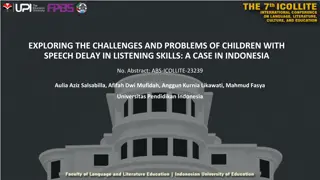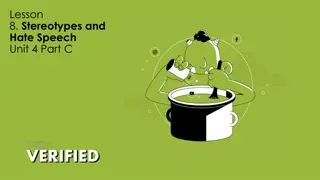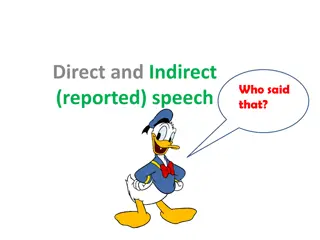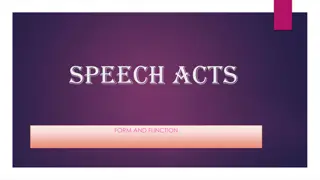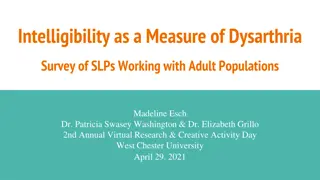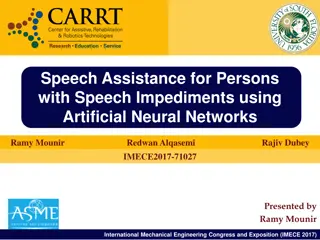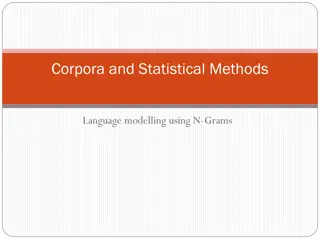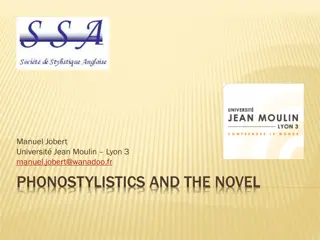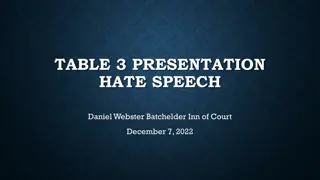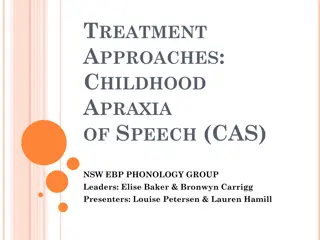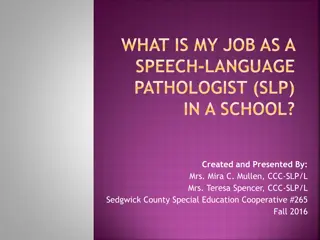Understanding Parts of Speech in English Language
This content delves into various aspects of parts of speech in the English language, covering sentences, phrases, and clauses. It discusses the use of adjectives, nouns, pronouns, verbs, adverbs, prepositions, conjunctions, and interjections, providing examples and explanations. Additionally, it explores different kinds of nouns, their functions, and how to identify common, proper, collective, and abstract nouns in sentences. The content offers exercises to practice recognizing and classifying nouns. Visit the provided link for more detailed lectures.
Download Presentation

Please find below an Image/Link to download the presentation.
The content on the website is provided AS IS for your information and personal use only. It may not be sold, licensed, or shared on other websites without obtaining consent from the author. Download presentation by click this link. If you encounter any issues during the download, it is possible that the publisher has removed the file from their server.
E N D
Presentation Transcript
Parts of Speech Sentence, Phrase & Clause MOAZZAM ALI MALIK DEPARTMENT OF ENGLISH UNIVERSITY OF GUJRAT https://uogenglish.wordpress.com/
Consider the use of Fast He came by a fast train Muslims observe fast, in Ramazan. He ran fast to win the race My brother fasts every Monday. https://uogenglish.wordpress.com/ Visit for more lectures
Parts of Speech Nouns Pronouns Adjectives Verbs Adverbs Prepositions Conjunctions Interjections 1. 2. 3. 4. 5. 6. 7. 8. https://uogenglish.wordpress.com/ Visit for more lectures
Nouns (Kinds): Summary Country, city, dog, man, table 1. 2. Pakistan, Lahore, Akhtar, Faiza 3. beauty, honesty, courage, fear 4. horse, people, fruit, brick, air 5. crowd, flock, group, swarm 6. book, pen, apple, boy, sister 7. bread, cream, gold, paper, tea 8. a man's job, the people's choice 9. silver, water, milk, sugar i. petrol pump, hitch-hiker, classroom ii. car driving, weight-lifting, body-building iii. waiting list, driving licence, dining-room, Common nouns: 1. 2. Proper nouns: 3. Abstract nouns: 4. Concrete noun: 5. Collective nouns: 6. Countable nouns: 7. Uncountable 8. Possessive: 9. Material noun: 10. Compound nouns: i. Noun + noun: ii. Noun + gerund: iii. Gerund + noun: https://uogenglish.wordpress.com/ Visit for more lectures
Nouns: function A noun can function as: The subject of a verb: Tom arrived. The complement of the verbs be, become, seem: Tom is an actor. The object of a verb: I saw Tom. The object of a preposition: Ispoke to Tom. A noun can also be in the possessive case: Tom's books. https://uogenglish.wordpress.com/ Visit for more lectures
Exercise 3 Point out the Nouns in the following sentences, and say whether they are: Common, Proper, Collective or Abstract 1. The crowd was very big. 2. Always speak the truth. 3. We all love honesty. 4. Our class consists of twenty pupils. 5. The elephant has great strength. 6. Ali was famous for his wisdom. 7. Cleanliness is next to godliness. 8. We saw a fleet of ships in the harbour. 9. The class is studying grammar. 10. The Chanab overflows its banks every year. https://uogenglish.wordpress.com/ Visit for more lectures
Exercise 3 Point out the Nouns in the following sentences, and say whether they are: Common, Proper, Collective or Abstract 1. The crowd was very big. 2. Always speak the truth. 3. We all love honesty. 4. Our class consists of twenty pupils. 5. The elephant has great strength. 6. Ali was famous for his wisdom. 7. Cleanliness is next to godliness. 8. We saw a fleet of ships in the harbour. 9. The class is studying grammar. 10. The Chanab overflows its banks every year. https://uogenglish.wordpress.com/ Visit for more lectures
Pronouns: (Summary) the person speaking: (first person) SINGULAR -- PLURAL the person spoken to: (second person) you the person spoken of: he (she) it and they [Demonstrative Pronouns] Personal REFLEXIVE When the action done by the subject turns back (reflects) upon the subject; as, I hurt myself. We hurt ourselves EMPHATIC Compound Personal Pronouns are used for the sake of emphasis, I myself saw him do it. They themselves admitted their guilt. DEMONSTRATIVE INDEFINITE This, that, these , those This is my book. It refers to an unspecified noun or nouns Few, Some, Any, some one There are some in the box https://uogenglish.wordpress.com/ Visit for more lectures
Pronouns DISTRIBUTIVE It denotes all of a class taken separately. Each of them has performed satisfactorily. Either of the two pencils will do. RELATIVE A relative pronoun is used to connect a subordinate clause to the main clause I met Hari who had just returned. I have found the pen which I lost. Here is the book that you lent me. Whoever, whoso, whosoever; whichever; whatever, whatsoever. Compound Relative Interrogative Who is there? Who are you? About whom you are thinking? / Who are you thinking about? Whom do you want? / Who do you want? Whose is this book? Which is the house? https://uogenglish.wordpress.com/ Visit for more lectures
Pronouns: Activity Tell which Pronouns in the following sentences are Reflexive and which Emphatic: 1. I will go myself. 2. Ali has hurt himself. 3. We often deceive ourselves. 4. I myself heard the remark. 5. You express yourself very imperfectly. https://uogenglish.wordpress.com/ Visit for more lectures
Pronouns: Activity Tell which Pronouns in the following sentences are Reflexive and which Emphatic: 1. I will go myself. 2. Ali has hurt himself. 3. We often deceive ourselves. 4. I myself heard the remark. 5. You express yourself very imperfectly. https://uogenglish.wordpress.com/ Visit for more lectures
Adjective Demonstrative: Distributive: Qualitative: Quantitative: this, that, these, those (this book is mine) each, every; either, neither (each student ) clever, good, fat, golden (a good boy ) some, any, no; little,many, (some people ) Definite Numeral: Cardinals: One, two, three, etc. Ordinals: First, second, third, etc. Indefinite Numeral: All, no; many, few; some, any; certain, Distributive Numeral :Each, every, either, neither Pakistani cloth, Arabian sea, Turkish cap which, what, whose (which book is yours?) my, your, his, her, ours (My book is here) This, That, These, Those This chair is made of wood. Proper Interrogative Possessive Demonstrative https://uogenglish.wordpress.com/ Visit for more lectures
Demonstrative Pronoun & Demonstrative Adjective Is this book yours or mine? This is my book I gave him that car? That is my father s car These shoes are my favourite. These are my favourite shoes. https://uogenglish.wordpress.com/ Visit for more lectures
Demonstrative Pronoun & Demonstrative Adjective Is this book yours or mine? This is my book I gave him that car? That is my father s car These shoes are my favourite. These are my favourite shoes https://uogenglish.wordpress.com/ Visit for more lectures
Indefinite Pronoun & Indefinite Adjective There are several people in the safe room. There are several in the safe room. I have seen some cartridges in the cupboard. I have seen some in the cupboard. There are only a few deer left. There are only a few left. https://uogenglish.wordpress.com/ Visit for more lectures
Indefinite Pronoun & Indefinite Adjective There are several people in the safe room. There are several in the safe room. I have seen some cartridges in the cupboard. I have seen some in the cupboard. There are only a few deer left. There are only a few left. https://uogenglish.wordpress.com/ Visit for more lectures
Distributive Pronoun & Distributive Adjective Each of ( Preposition )us will get a certificate. Each student was given two dollars. Each man writes in a different way. Either of ( Preposition )these two pens will do. Neither of ( preposition ) them will pass this time. Every boy, every girl and every child is going to the fare. Either road is safe. Neither application was approved. Every is always used as an adjective. https://uogenglish.wordpress.com/ Visit for more lectures
Distributive Pronoun & Distributive Adjective Each of ( Preposition )us will get a certificate. Each student was given two dollars. Each man writes in a different way. Either of ( Preposition )these two pens will do. Neither of ( preposition ) them will pass this time. Every boy, every girl and every child is going to the fare. Either road is safe. Neither application was approved. Every is always used as an adjective. https://uogenglish.wordpress.com/ Visit for more lectures
Verbs: shows action or being There are three types of verbs: Action verbs (which can be transitive or intransitive) Transitive & Intransitive (gave, bring, walk) Modal verbs (sometimes called helping verbs) can could may might must ought to shall should will would Auxiliary verbs (sometimes called linking verbs) (*is/am/are, has/have, was/were) * to be verbs describe a state of being. https://uogenglish.wordpress.com/ Visit for more lectures
Action Verbs Transitive [AV DO] Verb action has a noun or pronoun receiver (a.k.a. direct object) I ate an apple. Susan wrote a great essay. Intransitive Verb action has no receiver (no direct object) I ate earlier. Susan wrote all night. https://uogenglish.wordpress.com/ Visit for more lectures
THE INFINITIVE Bare Infinitive: (You had better say nothing.) Full Infinitive: (His plan is to keep the affair secret.) Split Infinitive:(It would take ages to really master this subject.) Use of the Infinitive To err is human. He likes to play cards. Her greatest pleasure is to sing. The speaker is about to begin. Preposition) (Subject) (Object) (Complement) (Object of a https://uogenglish.wordpress.com/ Visit for more lectures
Exercise : Transitive or Intransitive 1. The sun shines brightly. 2. The boy cut his hand with a knife. 3. The clock stopped this morning. 4. The policeman blew his whistle. 5. The sun rises in the east. 6. An old beggar stood by the gate. 7. The clock ticks all day long. 8. I looked down from my window. 9. Put away your books. 10. The moon rose early. 36 https://uogenglish.wordpress.com/ Visit for more lectures
Adverbs Describe/Modify Verbs Adjectives Other Adverbs Good vs. Well Types of Adverbs: Time (when) Place (where) Manner (how) Degree (to what extent) Why (condition/reason) Affirmation (yes) Negation (no, not) Answer Questions: When? Where? How? To what extent? Condition or Reason Many adverbs end in the suffix ly . https://uogenglish.wordpress.com/ Visit for more lectures
Adverbs (Summary) bravely, fast, happily, hard, quickly, well 1. 2. by, down, here, near, there, up 3. now, soon. still, then, today, yet 4. always, never, occasionally, often, twice 5. certainly, definitely, luckily, surely, yes, no Manner: 1. 2. Place: 3. Time: 4. Frequency: 5. Sentence/Aff irmation/Ne gation: 6. Reason: 7. Degree: 8. Interrogative 9. Relative: 6. Hence, therefore 7. fairly, hardly, rather, quite, too, very, far 8. when? where? why? 9. when, where, why https://uogenglish.wordpress.com/ Visit for more lectures
Prepositions How many words can you relate to the mountain? up the mountain down the mountain around the mountain through the mountain over the mountain behind the mountain https://uogenglish.wordpress.com/ Visit for more lectures
Prepositions PP Common Prepositions: aboard about above across after against along among around as at Visit for more lectures before behind below beneath beside besides between beyond but (except) by down during except for from in inside into like near of on onto opposite out outside over past since through throughout to toward under underneath until up upon with within https://uogenglish.wordpress.com/
THE PREPOSITION A Preposition is a word placed before a noun or a pronoun to show in what relation the person or thing denoted by it stands in regard to something else. [The word Preposition means 'that which is placed before'.] Single word Preposition 2. Compound Prepositions At, by, for, from, in, of, off, on, out, through, till, to, up, 2. About, above, across, before, behind, below, beneath, between, beyond, inside, outside, underneath, within, 3. according to , in accordance with , in place of, agreeably to , in addition to , in reference to 4. Barring, concerning, considering, during, notwithstanding, pending, regarding, 1. 1. 3. Phrase Prepositions 4. Participial Prepositions. https://uogenglish.wordpress.com/ Visit for more lectures
Conjunctions and Their Types A conjunction is a part of speech that is used to connect words, phrases, clauses, or sentences. 1. conjunctions are conjunctions which connect two equal parts of a sentence. The most common ones are and, or, but, and so Coordinating https://uogenglish.wordpress.com/ Visit for more lectures
Coordinating Conjunctions Examples: Coordinating Conjunctions I m excited, for today is my birthday. The pens and pencils are here. I didn t like the movie, nor did she. I like carrots but not lima beans. Are you eating pizza or hamburgers? He works quickly yet carefully. Mary wanted a new phone, so she saved her allowance money. for and nor but or Yet So (Fan boys) Conjunction Junction, what's your function? https://uogenglish.wordpress.com/ Visit for more lectures
Conjunctions and Their Types 2. parts of a sentence that are not equal and will be discussed more in another class. For now, you should know some of the more common subordinating conjunctions such as: after before although if as since because than Subordinating conjunctions connect two unless until when while https://uogenglish.wordpress.com/ Visit for more lectures
Conjunctions and Their Types 3. of conjunctions that work together. In the sentence Both Jan and Meg are good swimmers, both . . .and are correlative conjunctions. The most common correlative conjunctions are: both . . .and either . . . or neither . . . nor not only . . . but also Correlative conjunctions are pairs https://uogenglish.wordpress.com/ Visit for more lectures
Correlative Conjunctions Correlative Conjunctions Examples: Either ~ or I ll either walk or jog home. Neither ~ nor Neither you nor I have blue eyes. Not only ~ but also Not only do I like ELA, but I also like science class. Both ~ and Leah earned an A in both math and religion. Whether ~ or We need to decide whether to leave or to stay. https://uogenglish.wordpress.com/ Visit for more lectures
Interjections!!!!!!! Some interjections are followed by commas, and indicate a mild feeling instead or a strong one. Interjections typically indicate strong feelings or excitement. Wow! We won! Ouch! That pan is hot! Yes! I got an A! Well, I better get started. Oh, how I dread Mondays. Ouch! He yelled an interjection when the nurse gave him an injection! https://uogenglish.wordpress.com/ Visit for more lectures



